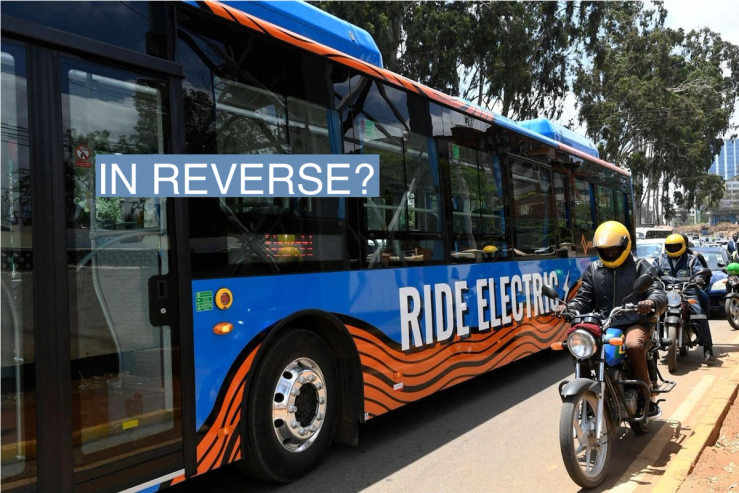The News
NAIROBI — Kenya’s push to introduce new taxes on some electric vehicles and their batteries could stifle growth in the country’s fledgling e-mobility sector, experts have warned.
The country’s new finance bill proposes the introduction of value added tax (VAT) on electric bikes and buses, as well as solar and lithium-ion batteries. It would also introduce an eco tax that would raise the price of a 60 kilogram solar battery in Kenya by $312 (45,000 Kenyan shillings), according to the Nairobi-based Associated Battery Manufacturers (ABM).
Kenya has previously sought to increase the country’s electric vehicle adoption. Tax breaks were cited by the country’s energy regulator as spurring a five-fold increase in the number of new electric vehicles registered in 2023.
Some 2,694 electric vehicles, including e-bikes and e-buses, were registered in Kenya in 2023 — a massive increase from 475 units registered the previous year. E-mobility startups in Kenya have raised more than $52 million in capital financing, the highest in Africa.
EV industry insiders say the new taxes could slow adoption and disincentivize e-mobility companies from setting up shop in Kenya.
Tom Courtright, research director at the Africa eMobility Alliance (AfEMA), said the proposed taxes were a “negative signal.”
“It’s very likely that if the bill goes through in its current form, interest and confidence from investors and international donors in Kenya’s EV sector will cool,” Courtright told Semafor Africa.
Know More
Kenya drafted an e-mobility policy in April meant to promote the local manufacturing and assembly of electric vehicles (EVs). It seeks to offer EV manufacturers and assemblers government incentives, and includes requirements on the use of locally sourced materials in EVs to be implemented gradually.
The draft policy also aims to offer increased government support for local battery manufacturing, recycling, and repurposing efforts.
The country also began issuing green-coloured license plates for EVs to “raise awareness among the general public and encourage more people to consider switching to e-mobility.”
Kenya’s vehicle market is dominated by secondhand cars, of which 90% are imported from Japan which also drives on the left. Removing incentives which make EVs more affordable would likely lead to more car buyers purchasing old, fuel-inefficient cars that are bad for the environment.
Martin’s view
The latest tax proposals seem to fly in the face of President William Ruto’s sustained push to position Kenya as a hub for the EV sector in Africa. Since his election in 2022, climate change and the transition to green energy and EVs have been among his administration’s biggest focus areas, and this commitment combined with incentives including tax breaks helped attract numerous investors to the country’s EV sector.
In the past year alone, e-mobility startups including Roam, Spiro and Ampersand have significantly expanded their operations in Kenya. Roam opened the region’s largest electric motorcycle assembly plant with the capacity to produce 50,000 electric bikes a year. Spiro, with Ruto’s endorsement, began its push to introduce 1 million electric motorcycles in Kenya as well as battery charging and swapping stations. Ride hailing apps including Uber and Bolt also began adding hundreds of EVs to their fleets in Kenya.
Adoption of EVs in Kenya so far has been primarily driven by the operators of motorcycle taxis, known locally as boda bodas, who are keen on saving on fuel. Significant price increases due to taxes would inevitably cause many potential EV users to consider other alternatives, slowing down their adoption. The growing use of electric buses, which are increasingly being embraced by some of Nairobi’s biggest public transport companies, is also bound to be hit.
Guy Jack, CEO of Associated Battery Manufacturers, in a statement described the new taxes as “completely unsustainable” and warned of their impact on jobs. Those in the sector are expected to offer opposition to the bill as it goes through the public participation stage, before the country’s Parliament ultimately decides its fate.
Room for Disagreement
Ruto has defended the proposed changes to the VAT system and tax hikes contained in the finance bill amid widespread public frustration, insisting that Kenya needs to dramatically raise tax revenues to reduce its debt burden and unlock funds for development projects. Debt service payments took up 84.4% of the country’s tax revenues in the eight months to February 2024, an all-time high.
“I am not going to preside over a bankrupt country ... I’m not going to preside over a country in debt distress,” he said at an event in Nairobi on May 15. “I persuaded and made a case to the people of Kenya that we must begin to enhance our revenue because if we are a serious state we must be able to enhance our taxes.”
The View From Tunisia
Tunisia’s government has rolled out various tax cuts and purchase incentives to help achieve its aim of having 130,000 electric vehicles on its streets by 2030. It has lowered VAT and customs duties on electric vehicle recharging equipment, as well as offering motorists TND10,000 ($3,200) in purchase incentives to switch to EVs.
The changes have been been credited with growing investor interest in the country’s EV sector.


